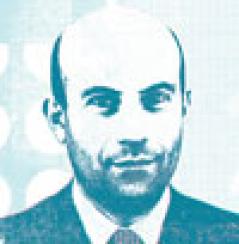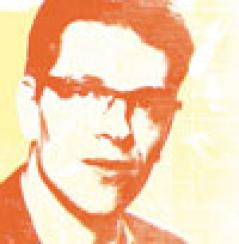Accounting & Valuation Sarah Deans J.P. Morgan
second team Kenneth Lee & team Citi
third team Dennis Jullens UBS
Sarah Deans of J.P. Morgan Securities leapfrogs from third place to capture her first-ever first-place finish. In July, Deans informed investors that the International Accounting Standards Board was facing extreme political pressure to allow reclassification of some financial instruments that were subject to mark-to-market accounting; in October, after the board agreed to allow reclassification, Deans published a report warning clients of risks associated with allowing banks to defer recognition of losses. "Her work on the IASB is of a consistently high standard," declares one money manager. Deans, 36, who earned a bachelor’s degree in mathematics from the University of Cambridge in 1994, worked as an accountant at Coopers & Lybrand in London and Zurich and then as an equity analyst at Lehman Brothers in London before joining J.P. Morgan in 2004. The Citi duo led by Kenneth Lee slips to second place but continues to win praise for "knowing how to make valuation and accounting issues understandable and useful," according to one investor. Singled out for special recognition is the team’s October report, "Balance Sheet Brawn," which detailed an analytical framework for measuring the financial strength of industrial companies. Dennis Jullens, co-leader of last year’s No. 2 team, finishes third, and now works solo, following Stephen Cooper’s June departure from UBS for the IASB. The Amsterdam-based researcher, whose work is described by one fund manager as "highly informative and very timely," is lauded for a June report, "Pensions in Europe," which found that although European defined benefit plans offer fewer benefits than their U.S. counterparts, they are better funded.
Economics/Developed European Markets
Stéphane Déo & team UBS
second team Erik Nielsen & team Goldman Sachs
third team Dimosthenis-Alexios Patelis & team BofA–Merrill Lynch
runners-up Richard Reid, Michael Saunders & team Citi; David Mackie & team J.P. Morgan; Elga Bartsch & team Morgan Stanley; Bijal Shah & team SocGen
Climbing one rung to claim top honors for the first time is the UBS quintet guided by
Stéphane Déo, whose members are described by one portfolio manager as "the best Western European economists around." Noting in September that "the housing market tends to be strongly affected by country-specific issues," the team examined data on home prices in ten nations and concluded that four — Ireland, the Netherlands, Spain and the U.K. — were experiencing housing market bubbles (prices exceeding fair value by more than 20 percent). Among the report’s many predictions: an imminent "sharp decline in house-building in the U.K." Last month Britain’s National House-Building Council reported that home construction starts plunged 56 percent year-over-year in 2008. A native of France, Déo, 40, worked as an economist at Goldman Sachs International in Paris and London before joining UBS in 2001. He earned a Ph.D. in finance from the École des Hautes Études Commerciales de Paris in 1994. Unranked last year, the Goldman Sachs International squad steered by
Erik Nielsen captures second place. Nielsen — praised by one buy-side supporter for being "very direct and outspoken" — and his 15-member team published a report in June predicting the potential implosion of "systemic institutions" in the euro zone and noting that, despite the presence of a central bank and a single currency, bailouts or other responses would be handled on a country-by-country basis. Newcomer
Dimosthenis-Alexios Patelis guides the 24-member Banc of America Securities–Merrill Lynch team, unranked since 2002, to a third-place finish. Investors say analysts on the team "are not afraid to speak their minds" and are willing to "stand out from the crowd." In December 2007 the team advised clients to short the dollar and go long on the Japanese yen via options, amid growing concern that the U.S. would slip into a recession. The dollar weakened and the yen strengthened, resulting in an 8.3 percent gain by late February, when the team withdrew the recommendation as it reached its target.
Equity Strategy/Developed European Markets
Teun Draaisma & team Morgan Stanley
second team Albert Edwards, James Montier SocGen
third team Andrew Garthwaite & team Credit Suisse
runners-up Jonathan Stubbs & team Citi; Mislav Matejka & team J.P. Morgan; Nicholas Nelson & team UBS
Teun Draaisma, 38, leads Morgan Stanley’s team of six strategists to a second consecutive first-place finish. The analysts had been bullish on European equities since March 2003 but turned bearish in late 2007, warning clients in December that a nasty bear market was imminent and they should expect negative earnings growth and plummeting stock prices in 2008. Boy were they right. European stocks fell 40.9 percent last year in local currency terms. The researchers, praised by one investor for their ability to "distill complexity down to actionable recommendations with great consistency," remain bearish. Société Générale analysts James Montier and Albert Edwards, who debut in second place, earn plaudits from clients for their "nonconsensus" and "unconventional" thinking. Bearish on European equities since way back in 1997, because of a low-inflation economic environment, they turned uncharacteristically — and selectively — bullish in November, noting that European equities, which since 1927 had enjoyed an average price-earnings ratio of 16, now had an average P/E ratio of 12. Prices could still fall, they say, but companies with solid fundamentals and historically low P/E ratios present a virtually unprecedented buying opportunity. The Credit Suisse quartet guided by Andrew Garthwaite repeats in third. Described by one money manager as producing "the most thought-out and thorough top-down research I have seen," the team published a well-received report in June that argued that "the more the central banks focused on inflation, the more deflation was a problem," Garthwaite says. After a flurry of interest rate cuts by Europe’s central banks in the fall, euro-zone consumer price growth slowed to an annualized rate of 1.6 percent in December, its lowest level in more than two years and less than half the 4 percent annualized rate recorded in June.
Quantitative Research
Marco Dion & team J.P. Morgan
second team Inigo Fraser-Jenkins & team Nomura
third team David Jessop & team UBS
Unranked for the past five years, the J.P. Morgan Securities’ team, now a trio helmed by new leader
Marco Dion , catapults to the top spot. Buy-siders praise the group’s "no-nonsense approach" and research that is presented "clearly and without needless complication." Of particular interest was a September report, "Analyzing Quant Performance and Activity over the Summer," which showed that during July and August correlation among sectors plunged while correlation among stocks within the same sector soared, indicating that macroeconomic factors were exerting greater influence over investors’ decisions than individual company fundamentals. Dion, 32, earned a bachelor of science degree in finance from Hautes Études Commerciales in Brussels in 1998. The Belgium native, who worked as a senior trader at Bernard L. Madoff Investment Securities in London before joining J.P. Morgan in May 2007, says he was "shocked" at news that his former employer stands accused of allegedly masterminding a $50 billion Ponzi scheme.
Inigo Fraser-Jenkins steers his 11-member team to a second-place finish for a third year running. The troupe, with Nomura International since October, when the firm acquired Lehman Brothers Holdings’ European equity and advisory units, provides "fresh ideas about quant equity modeling," according to one backer. Shortly after moving to Nomura, the team updated the multifactor stock selection model it had been using at Lehman, incorporating value and momentum into the mix, then back-tested it, using data from 1991 through 2007. The result: "54 percent of the stocks in the long portfolio outperformed the market, and 55 percent of stocks in the short portfolio underperformed the market every quarter." For a third straight year,
David Jessop guides the 13-strong UBS contingent to third place. Clients applaud the team’s September report, "Less Pain, More Gain?," which questioned the widely held belief that investors must shoulder more risk to reap greater rewards. Analyzing 16 years’ worth of data, the strategists concluded that low-volatility stocks had average annual returns of roughly 8 percent above the risk-free rate (i.e., U.S. Treasuries).
Socially Responsible Investing
Michael Tyrrell & team Citi
second team Claudia Kruse & team J.P. Morgan
third team Sarah Forrest & team Goldman Sachs
runner-up Valéry Lucas-Leclin, Sarbjit Nahal & team SocGen
Michael Tyrrell , 37, who leads the two-analyst Citi team to top honors in this new sector, is "very good at identifying new themes and trends," according to one money manager. Clients also praise the team’s October report, "Climate Change: Tomorrow’s Problem? Or Part of the Solution?," which offered ways in which proposed infrastructure investing to rejuvenate European economies might incorporate environmentally friendly approaches, thereby boosting the profitability of companies that use "green technology." In late November, Citi discontinued coverage of SRI as a stand-alone sector. Tyrrell, who earned a master’s degree in environmental technology from London’s Imperial College of Science, Technology and Medicine in 1996, was an SRI analyst at HSBC Investment Bank before joining Citi in 2005. Debuting in second place is the J.P. Morgan Securities duo guided by Claudia Kruse. In May, 107 nations agreed to the final draft of the Convention on Cluster Munitions, which bans the use of cluster bombs; in early June the team published a well-received report identifying cluster-bomb and component manufacturers, to assist clients in making appropriate investment decisions. Kruse "is aware of the needs of her audience and produces work accordingly," says one loyalist. In December, J.P. Morgan disbanded its SRI team. The Goldman Sachs International quartet conducted by Sarah Forrest, which takes third place, "consistently produces extensive and useful sector analysis," says one backer. Clients applaud the team’s annual SUSTAIN focus list, which highlights environmentally friendly companies best positioned to succeed over the long term. Although the analysts decline to disclose the companies on this year’s roster, previous lists have included U.S.-based breakfast-food producer Kellogg Co. and soft-drinks manufacturer PepsiCo and Swiss pharmaceuticals giant Roche Holding.
Return to the Best Analysts of the Year
Return to the All-Europe Research Team Rankings










